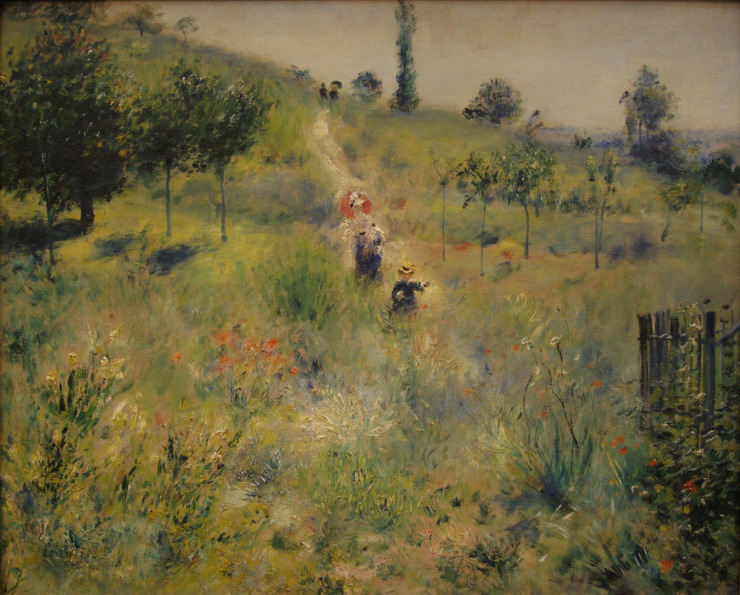The Rose of the World
Who dreamed that beauty passes like a dream?
For these red lips, with all their mournful pride,
Mournful that no new wonder may betide,
Troy passed away in one high funeral gleam,
And Usna’s children died.
We and the laboring world are passing by:
Amid men’s souls, that waver and give place,
Like the pale waters in their wintry race,
Under the passing stars, foam of the sky,
Lives on this lonely face.
Bow down, archangels, in your dim abode:
Before you were, or any hearts to beat,
Weary and kind one lingered by His seat;
He made the world to be a grassy road
Before her wandering feet.
-WB Yeats
Enjoy Artistic Representations of “The Rose of the World” by WB Yeats

Girl with a Rose by Guido Reni, early 17th century.

Chemin Montant dans les Hautes Herbes by Renoir, 1875.
Listen to this Reading of “The Rose of the World”
Listen to Musical Interpretations of “The Rose of the World” by WB Yeats
About W.B. Yeats
William Butler Yeats was born in 1865 in Dublin into a family of the Protestant Anglo-Irish landowning class. He lived in Dublin and London during his growing up years. He was very much affected by the politics of the time, as he was a young adult when the protestant minority in power began to be displaced by the predominantly Catholic nationalist movement.
Yeats studied law for a time but eventually moved to London to study art. He was an accomplished playwright, and a founder of the Irish Theatre which was later to become the Abbey Theatre. While he is better known for his poetry, Yeats was awarded the Nobel Prize for Literature in 1923 more for his theatrical works than his verse. He was the first Irishman to be awarded the prize.
His first collection of poems was published in 1889, and there is strong evidence of the influence of Edmund Spenser and Percy Bysshe Shelley. Later, his poetry became more rooted in realism and the physical, with influence of Ezra Pound and William Blake apparent. Common themes in his poetry include mysticism, spiritualism, the occult and Irish identity and nationalism.
Yeats was appointed to the Irish senate in 1922. He was married, but had an ongoing relationship of sorts with a former love, Irish activist and revolutionary Maud Gonne. Known as one of the greatest poets of the 20th century, Yeats died in 1939.
That’s it for The Rose of the World!
BUY ‘HOW TO WRITE A FORM POEM’ NOW!
